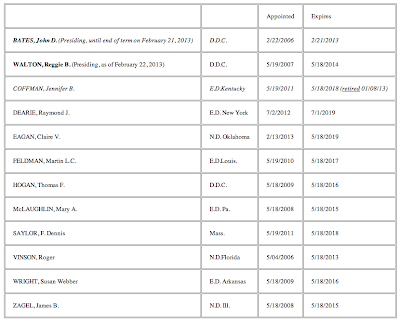The recent passing of House Resolution 5949 went pretty much unnoticed by just about everyone. The Bill, the FISA Amendments Act Reauthorization Act of 2012 was sponsored by Texas Representative Lamar Smith (R) and looks like this:
While it sounds innocuous, the original FISA or Foreign Intelligence Surveillance Act was originally enacted in 1978 in response to the widespread abuse of government wiretaps. Interestingly, the original Act was introduced by one Senator Edward Kennedy. The law governs the surveillance of non-Americans living outside of the United States for the purpose of collecting intelligence related to foreign powers. The original FISA was seen to be too restrictive in the government's eyes after the attacks of September 11th, 2001 and, under the Patriot Act, FISA's powers were expanded to cover terrorism suspects and agents of foreign countries. In 2008, Congress overhauled FISA and expanded the government's powers to listen in to American communications. In addition, the updated version offered legal immunity for any telecommunications company that co-operated with the National Security Agency wiretapping program.
In a rather Orwellian twist, government requests for surveillance are adjudicated by a special eleven member (since 2001) secret court called the Foreign Intelligence Surveillance Court (FISC) whose current members are:
It was this court that the Bush Administration bypassed when they used the Patriot Act to direct the NSA to spy on all telecommunications companies and gather intelligence from phone conversations, email, web browsers etcetera.
What should be surprising but isn't in light of HR 5949 is the fact that Senator Barack Obama voted in favour of granting immunity to the aforementioned telecommunications companies in 2008.
Now, let's get back to HR 5949. It's amazing how this bill was passed post-haste; it was introduced to the House on June 15th, 2012, passed the House on September 12th 2012, passed the Senate on December 28th, 2012 and was signed by President Obama on December 30th, 2012. It passed the House by a vote of 301 for and 118 against and the Senate by a vote of 73 for and 23 against. In the House, just seven Republicans voted against HR 5949 and Democrats were split 74 voting for and 111 voting against it.
See, Washington really can get things done when it gets right down to it!
In a recent ruling, the Supreme Court refused to rule on a case, Clapper v. Amnesty International, noting that the lawyers and journalists bringing the suit did not demonstrate that they had suffered injury since they are merely speculating that their communications with foreign contacts will be acquired as stated here, with Justice Alito noting that Section 1881 is the section of FISA that outlines procedures for targeting individuals for surveillance:
"Respondents assert that they have suffered injury in fact that is fairly traceable to §1881a because there is an objectively reasonable likelihood that their communications with their foreign contacts will be intercepted under §1881a at some point. This argument fails. Initially, the Second Circuit’s “objectively reasonable likelihood” standard is inconsistent with this Court’s “threatened injury” requirement. Respondents’ standing theory also rests on a speculative chain of possibilities that does not establish that their potential injury is certainly impending or is fairly traceable to §1881a. First, it is highly speculative whether the Government will imminently target communications to which respondents are parties. Since respondents, as U. S. persons, cannot be targeted under §1881a, their theory necessarily rests on their assertion that their foreign contacts will be targeted. Yet they have no actual knowledge of the Government’s §1881a targeting practices. Second, even if respondents could demonstrate that the targeting of their foreign contacts is imminent, they can only speculate as to whether the Government will seek to use §1881a-authorized surveillance instead of one of the Government’s numerous other surveillance methods, which are not challenged here. Third, even if respondents could show that the Government will seek FISC authorization to target respondents’ foreign contacts under §1881a, they can only speculate as to whether the FISC will authorize the surveillance. This Court is reluctant to endorse standing theories that require guesswork as to how independent decisionmakers will exercise their judgment. See, e.g., Whitmore, supra, at 159–160. Fourth, even if the Government were to obtain the FISC’s approval to target respondents’ foreign contacts under §1881a, it is unclear whether the Government would succeed in acquiring those contacts’ communications. And fifth, even if the Government were to target respondents’ foreign contacts, respondents can only speculate as to whether their own communications with those contacts would be incidentally acquired. "
Note the use of the words speculate and speculative. Basically, since the plaintiffs can't know if they and their foreign contacts are being secretly surveilled and under what authority the government is going to secretly spy on them, they have nothing to complain about. Since they can't prove it because it's secret, the legal action is groundless, the secrecy of the whole thing making for a perfect Catch-22.
And now, thanks to quick action by Congress and the Senate, Washington has extended FISA's powers for another five years!
Click HERE to read more of Glen Asher's columns
You can publish this article on your website as long as you provide a link back to this page.



Be the first to comment